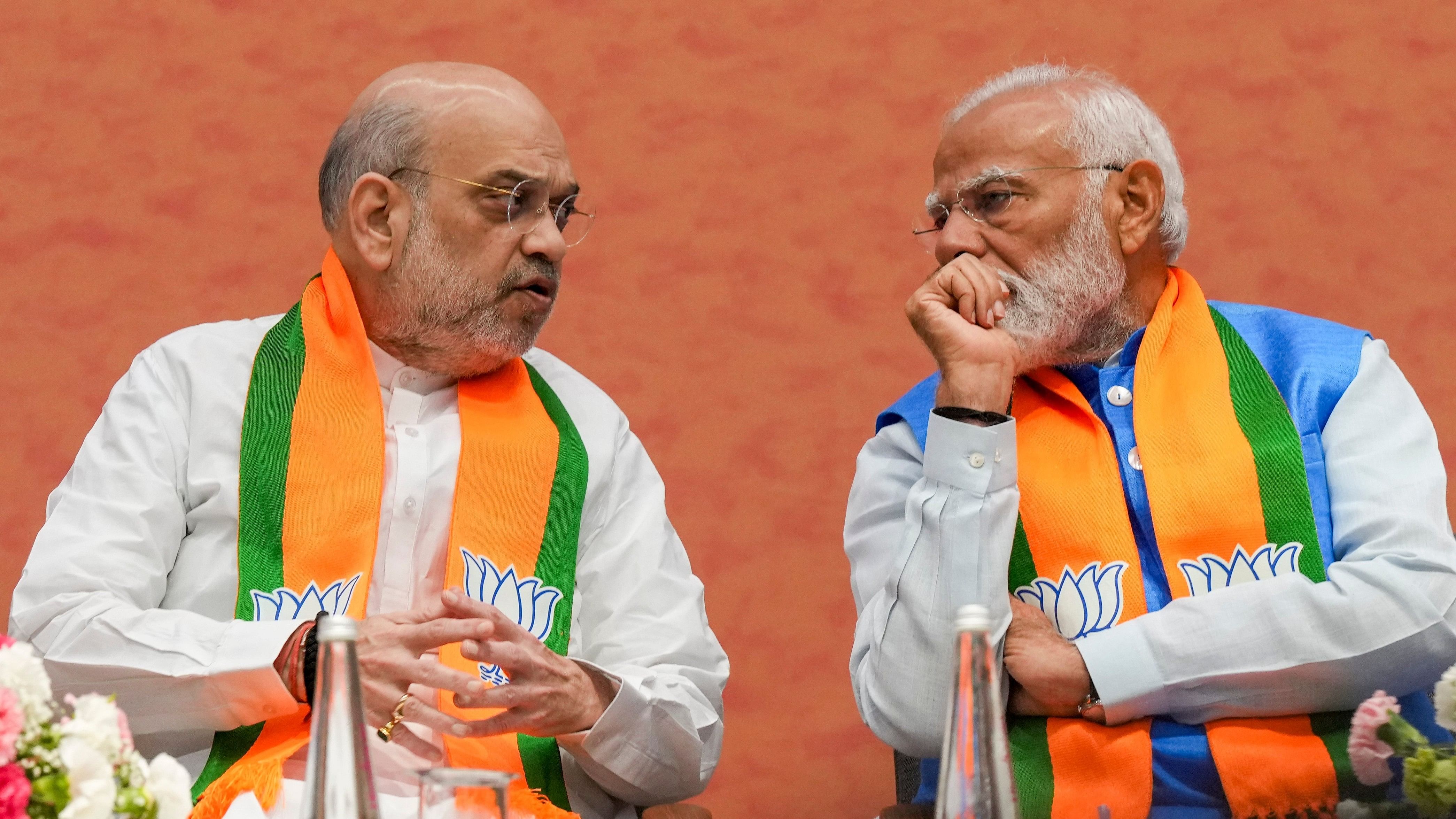
New Delhi: Prime Minister Narendra Modi and Union Home Minister Amit Shah during the release of BJP's election manifesto Sankalp Patra for the Lok Sabha polls, at the party headquarters, in New Delhi, Sunday, April 14, 2024.
Credit: PTI Photo
The Bharatiya Janata Party (BJP) released its election manifesto on April 14, pitching it as a ‘Sankalp Patra’, a document of resolutions underwritten by ‘Modi ki Guarantee’. The prime minister is front and centre of the document from beginning to end.
Unlike the Congress manifesto, which has a foundational logic, the BJP document is a catalogue of expediencies. Some pet projects are highlighted, others find no mention, one assumes, keeping in mind immediate contingencies. Among the contentious objectives flagged are the resolve to institute a one-election regime, and put in place a Uniform Civil Code (UCC). Notable by its absence is any reference to the National Register of Citizens (NRC). We’ll come to these later.
Welfare programmes already in place are trotted out, including free food grains for over 810 million people, but no position is outlined on ‘welfare’. We are not told whether welfare measures are indeed ‘rewris’, and whether offering sweetmeats is a legitimate object of State policy or whether these things just happen in election season.
On the welfare front, vague promises are made for agriculturists, which do not amount to any guarantee, Prime Minister Narendra Modi’s or otherwise, of a legal framework for minimum support prices (MSP) or any fundamental progress on rescuing the agrarian system from its fundamental problem: unprofitable operations caused by high production costs and unpredictable prices for harvests. Welfare measures, such as the expansion of the flagship Ayushman Bharat health insurance scheme to those over 70, pepper the ‘Resolution Document’, but there is no word on generating employment.
Pointing to this lack of a broader perspective is not simply a cavil. It needs attention because the BJP invites a discussion on the larger issues by continuously framing its governance record and its objectives in grandiose terms. It’s never a question of addressing urgent problems right away, it’s always about achieving something ‘unprecedented’ in some distant cloud-cuckoo land.
So, it is again. While the issues of the rising prices and record unemployment are not addressed, the manifesto becomes another marker on the way to a developed India — ‘Viksit Bharat’ — in 2047. Clearly that date has been chosen because it will mark 100 years of Independence. In this all-symbolism style of governance, you are left wondering about what’s happened in the past decade, because precious little has happened to change gears. The liberal patronage to cronies and the infatuation with vanity projects, think Vande Bharat trains, a mendacious repackaging of the old Shatabdis, has, in fact, given us a lost decade.
Given that most of the ‘Sankalp Patra’ is a vacuous exercise in vainglory and promoting the cult of personality, what stands out are the promises on the UCC and ‘one nation, one election’ (ONOE). Neither is democratically feasible, but they are party objectives, and are trotted out at crucial conjunctures for connected reasons. The conjuncture is provided by the elections and the need to reiterate slogans that will rally the faithful. The UCC is a majoritarian mobilisational gambit, while the constant harping on ONOE is powered by an authoritarian impulse.
The determination to keep in focus the objective of switching to an ONOE system keeps signalling the BJP’s determination to change the existing constitutional and governmental formats to both its constituency and to the Opposition. Any move towards ONOE will necessitate constitutional amendments and changes to basic laws such as the Representation of the People Act, because it will have to change federal arrangements, while also severely curtailing citizens’ electoral rights.
The UCC is another matter. It is a dog-whistling tactic to unsettle the Muslim community, because its personal laws would be expunged in the BJP’s conception of it. The overriding problem with the Sangh parivar’s UCC is that it is aimed at levelling out diversity. The BJP manifesto says gender equality cannot be achieved until a UCC, ‘drawing upon the best traditions and harmonising them with the modern times’, is put in place. This is a meaningless and misleading formulation. If banning polygamy is the issue, it should say so upfront, because most people agree with that objective.
A study published by the International Institute for Population Sciences (IIPS) in 2022, based on data from the National Family Health Survey, showed that 1.9 per cent of Muslim men practise polygamy. This figure is 1.3 per cent for Hindu men and 1.6 per cent for others.
It’s a problem that can be dealt with legislatively, consensually, and by demonstrating good faith. The BJP’s rhetoric, however, comes from an obviously majoritarian perspective.
(Suhit K Sen is author of ‘The Paradox of Populism: The Indira Gandhi Years, 1966-1977’.)
Disclaimer: The views expressed above are the author's own. They do not necessarily reflect the views of DH.